Unless otherwise stated all pictures on Berlioz Photos pages have been scanned from engravings, paintings, postcards and other publications in our collection. All rights of reproduction reserved.
This page contains portraits of the following: the King of Hanover, the King of Prussia, the Princess of Prussia (later Queen of Prussia), Alexander von Humboldt, and the Prince of Hohenzollern-Hechingen.
![]()
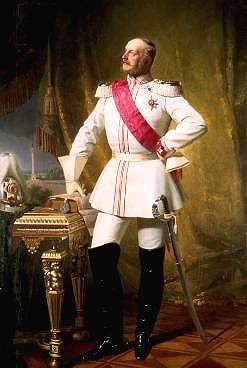
Berlioz’s evolving relations with the court of Hanover are traced in detail in the page on Hanover. His first visit in 1843 was not conspicuously successful. Berlioz gives a detailed account of that visit in his Memoirs (10th Letter from Germany). At the time the future king was only crown prince; a dedicated musician, he attended the concert given by Berlioz and spoke graciously to him, though there was little indication at the time of how well Berlioz’s music would be received in Hanover in subsequent visits. When Berlioz returned to Hanover in 1853, it was at the invitation of the crown prince who had now become King in 1851 and was keen to develop Hanover’s musical resources. He was to prove himself one of Berlioz’s most dedicated supporters among German princes, together with the King of Prussia and the Grand-Duke of Saxe-Weimar. It was again at his invitation that Berlioz returned again in 1854, to give concerts in the Court Theatre. On all those occasions he was warmly received by the King and his Queen, herself a keen musician, as he relates in a number of letters he wrote at the time CG nos. 1644, 1651, 1716 and 1726). Though Berlioz did not return to Hanover subsequently he remembered fondly how well he had been received there.

Berlioz’s relations with the royal court of Prussia are traced in detail in the page on Berlin. He only visit Berlin twice, in 1843 in the course of his first trip to Germany and again in 1847 on his return from Russia, but from the start the Prussian court established itself in his mind as the most cultured court in Germany. This was thanks in particular to the King of Prussia himself and his dedication to the arts and sciences; it was thanks also to the great interest in music shown by the Princess (later Queen) of Prussia, and to the eminent position held at court by the celebrated naturalist and explorer Alexander von Humboldt.
The visit of 1843 is described in detail in three letters which Berlioz published on his return to Paris in the Journal des Débats (8 October, 21 October and 8 November 1843), and which he later incorporated in his Memoirs. During his visit Berlioz secured an audience with the King and asked his permission to dedicate his Treatise on Orchestration to him (CG no. 823ter). On his return to Paris he sent an inscribed copy of the work to Berlin (CG nos. 873, 877), and the King thanked him personally in a signed autograph letter which is extant (CG no. 891bis, 23 March 1844).
Berlioz saw the King again in August 1845 on the occasion of the celebrations for the inauguration of the statue of Beethoven in Bonn, when the King invited him to a concert given at his castle of Brühl not far from Bonn (CG nos. 991, 992).
In 1847 the King facilitated Berlioz’s trip to Russia by providing him with a letter of introduction to his sister the Tsarina (Memoirs chapter 55). He later invited Berlioz to give on the return journey a complete performance of la Damnation de Faust in Berlin (19 June 1847). The invitation, his stay in Berlin, and the concert, are described in detail in a number of letters of Berlioz at the time (CG nos. 1106, 1108, 1110bis, 1114, 1115, 1120). Berlioz did not return to Berlin subsequently, but he long retained the memory of the King’s devotion to the arts and personal kindness to him.
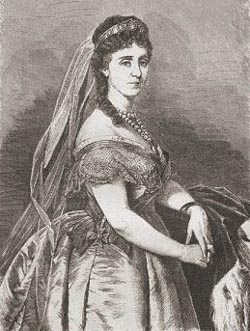
Berlioz first met Princess Augusta of Saxe-Weimar-Eisenach in Berlin in April 1843; she was married to the King’s brother, who was at the time Crown Prince of Prussia, hence her status as Princess. At his first meeting with the Princess Berlioz was struck by her musicianship (which her husband did not share): he mentions her ‘exquisite taste and knowledge of musical composition’; after the second concert she enquired about the orchestration of the middle section of the Queen Mab scherzo. Berlioz met her again in Bonn in 1845 (though on that occasion she did not remember their previous meeting: CG no. 992), and in Berlin in 1847. While still Princess she was a frequent visitor to the festival in Baden-Baden in years when Berlioz conducted it, in 1853, 1857, and 1861.
She only became Queen of Prussia when her husband succeeded to the throne in 1861 as Wilhelm I. As Queen, she made a point of attending a gala performance of Béatrice et Bénédict in Weimar on 8 April 1863 and two performances of the opera in Baden-Baden on 14 and 18 August of the same year; on this occasion she spoke at length to Berlioz about the opera and was most complimentary (see CG nos. 2709, 2710, 2762). In 1871 she was declared Empress of Germany.
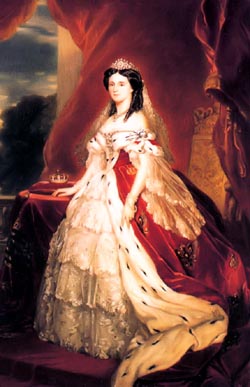
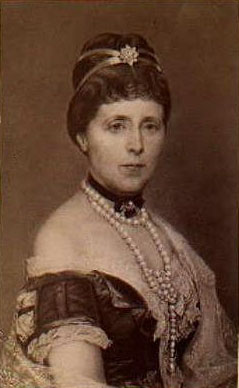
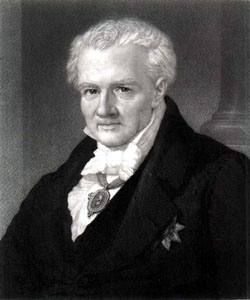
The above picture shows Humboldt at around the time Berlioz met him in Berlin.
Berlioz’s regard for Humboldt, the celebrated naturalist and explorer, went back to his youth and his passion for geography and foreign lands which he mentions in the Memoirs (chapters 2 and 12), a passion stimulated by reading all the books he could find in his father’s library, including Humboldt’s Tableaux de la Nature of 1808. Berlioz first met Humboldt in Paris in December 1842; the meeting took place opportunely just before Berlioz was about to set out on his first trip to Germany, and it prepared the ground for his visit to Berlin. Humboldt undertook to mention Berlioz to the Prussian King, of whom he was now an adviser (CG no. 791, cf. no. 791quater [vol. VIII]) and it may well be Humboldt who suggested to Berlioz that he should dedicate his Treatise on Orchestration to the King (see above on this). Berlioz met Humboldt several times during his stay in Berlin in 1843 and was introduced by him to the King (CG nos. 820, 838). The following year, it was Humboldt who presented to the King the copy of Berlioz’s Treatise which was destined for him (CG no. 877). Berlioz saw Humboldt again in Bonn in 1845 (CG no. 991), and for the last time in Berlin in 1847 (CG no. 1115). But his interest in Humboldt’s work continued undiminished: he acquired as they appeared the latest volumes (2 and 3) of Humboldt’s Cosmos, of which he had read volume one many years before, in his father’s library at La Côte Saint-André (CG no. 1279, 1 September 1849).
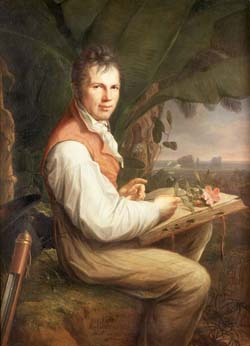
The original painting, by Friedrich Georg Weitsch, is at the Staatliche Museen zu Berlin-Preußischer Kulturbesitz, Alte Nationalgalerie Berlin.

Berlioz only visited the court of the Prince of Hohenzollern-Hechingen twice and at an interval of twenty years, for a few days at the turn of 1842 to 1843, then again in April 1863. The two visits were also widely spaced apart, the first at Hechingen in the Black Forest and the second far to the east at Löwenberg in Silesia, half-way beteen Dresden and Wroclaw. The 1848 revolution had forced the Prince to move his court from Hechingen to Löwenberg. A dedicated music-lover and francophile, the Prince invited Berlioz on both occasions to perform with his own court orchestra; in 1843 the orchestra was very small, but in 1863 it had now become a much more proficient ensemble. Though the two concerts were only footnotes in Berlioz’s long career, the friendliness and enthusiasm of the Prince and his court turned them into occasions that Berlioz remembered fondly. Berlioz dedicated his overture Roman Carnival to the Prince in 1844. Both visits are treated in detail in the page on Hechingen and Löwenberg, with extensive citations of the relevant evidence.
![]()
© (unless otherwise stated) Monir Tayeb and Michel Austin for all the texts and images on Berlioz Photo Album pages.
All rights of reproduction reserved.